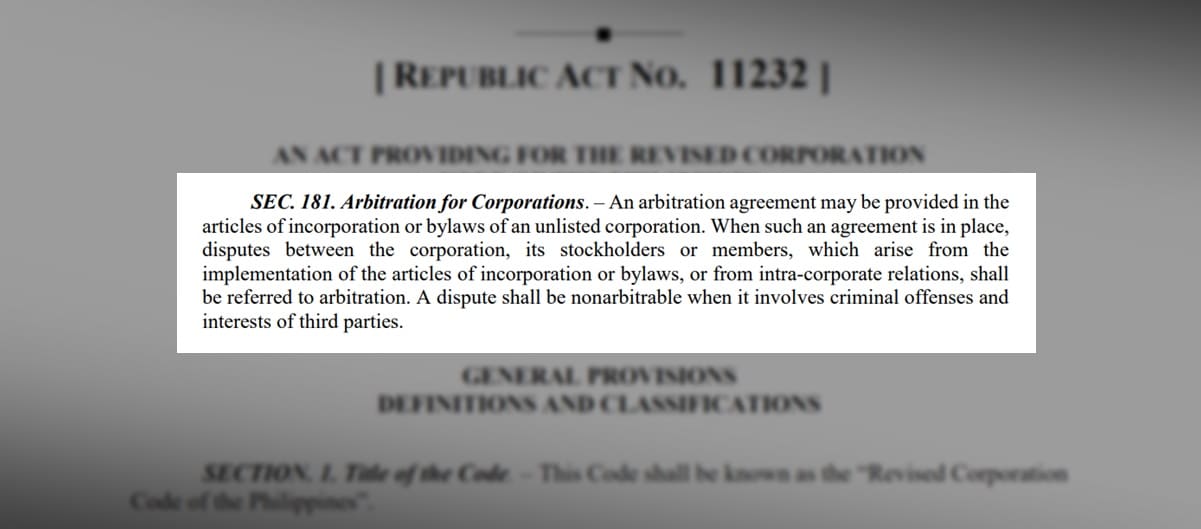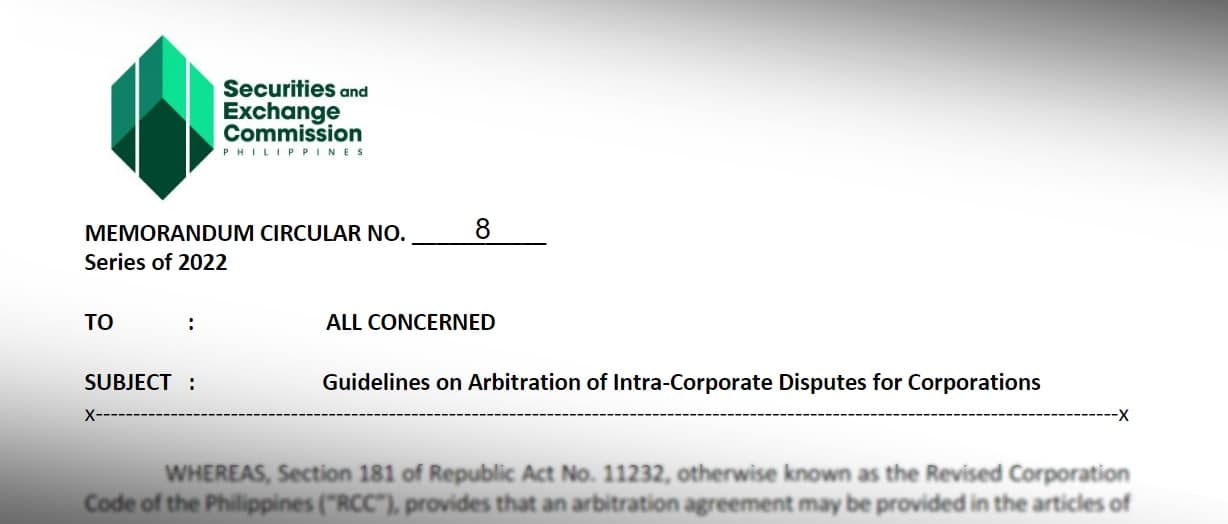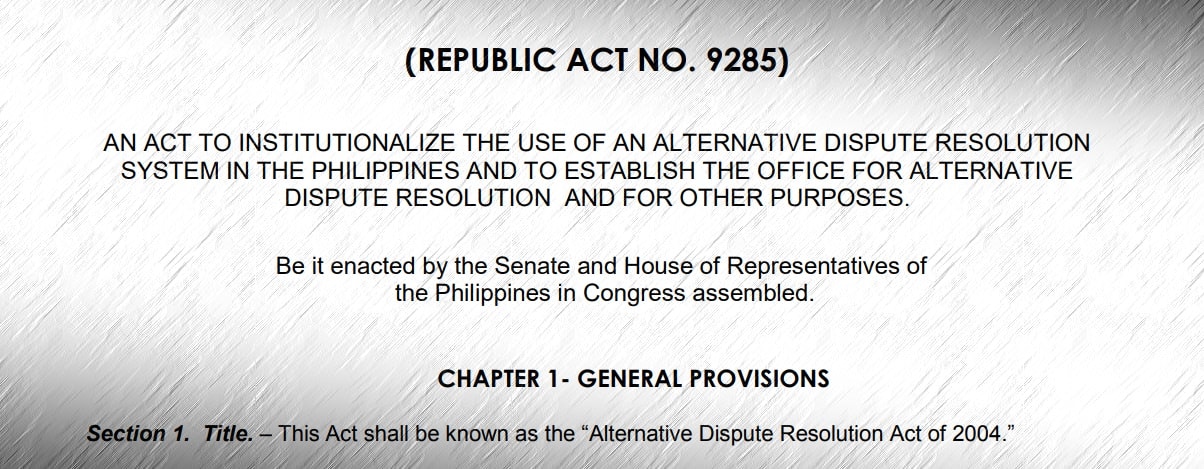Arbitration of Commercial Disputes in the Philippines

In the Philippines, corporate conflicts can be settled more quickly through arbitration.
Arbitration in the Philippines is a faster way to resolve corporate disputes.
This article discusses basic arbitration topics with a focus on domestic arbitration such as:
- Philippine Arbitration laws
- Types of Arbitration
- Basic Requirements of Arbitration Agreements
- Where, When and How Arbitration commences
Arbitration and other alternative dispute resolution methods like mediation, negotiation, and conciliation are favored over court action.[1]
[1] Steamship vs. Sulpicio Lines, G.R. No. 196072, September 20, 2017
Contents
- What is Arbitration?
- What are the types of Arbitration?
- What are the applicable laws on arbitration on intra-corporate disputes?
- Republic Act 9285 or the Alternative Dispute Resolution Act of 2004 (ADR Act)
- What disputes are arbitrable by corporations?
- When is arbitration commercial?
- Can corporations include arbitration agreements upon incorporation?
- What should provisions for arbitration contain?
- What happens if the Arbitration Agreement does not comply with the minimum provisions?
- Can other forms of alternative dispute resolutions be included in the arbitration agreement aside from arbitration?
- Can a corporation choose not to include an arbitration agreement in the AOI or bylaws?
- Who shall be bound by the arbitration agreement?
- Can the corporation, its directors, trustees, officers, and executives or managers be bound even if they are not signatories?
- What language shall be used during arbitration?
- What is the venue for arbitration?
- When can parties refer to arbitration?
What is Arbitration?

Noncompliance with the minimum provisions of an arbitration agreement renders it invalid but companies may still go through arbitration as provided for in the law.
Arbitration is an agreement between parties of disputes are resolved between them.
It is a binding, non-court process that requires licensed arbitrators appointed as per an agreed upon process.
It is governed by several Philippine Arbitration laws and also follows international guidelines.
A more formal definition is:
“Arbitration” means a voluntary dispute resolution process in which one or more arbitrators, appointed in accordance with the agreement of the parties, or rules promulgated pursuant to this Act, resolve a dispute by rendering an award.[1]
Arbitration can be a welcome development.
It is faster because it avoids the clogged Philippine court system altogether.
Philippine courts are generally very overworked.
Litigation takes years or decades before resolution.
Additionally, Philippine courts have intricate process mechanisms since great care is given in order to protect the interests of the parties involved.[2]
Arbitration instead simplifies these and can be the more practical choice.
[1] Sec. 3(d), RA 9285
[2] IDE Asian Law Series No. 18, Dispute Resolution Mechanisms in the Philippines, retrieved at https://www.ide.go.jp/library/English/Publish/Reports/Als/pdf/18.pdf
What are the types of Arbitration?

Arbitration may take the form of institutional or ad hoc. It may either be domestic or foreign in nature.
Arbitration can either be Ad hoc or Institutional.
Additionally, it can also be international or domestic.
Let’s first define Ad hoc vs Institutional Arbitration
- Ad hoc arbitration means an arbitration administered by an arbitrator and/or the parties themselves. An arbitration administered by an institution shall be regarded as ad hoc arbitration if such institution is not a permanent or regular arbitration institution in the Philippines.[1]
- Arbitration is institutional when it is administered by an entity, which is registered as a domestic corporation with the Securities and Exchange Commission (SEC) and engaged in, among others, arbitration of disputes in the Philippines on a regular and permanent basis.[2]
Now, let’s also domestic vs international Arbitration
- Arbitration is international if:
- the parties to an arbitration agreement have, at the time of conclusion of the agreement, their places of business in different states; or
- the place of arbitration, or place where a substantial part of the obligations is to be performed, is situated outside the state in which the parties have their places of business; and
- the parties have expressly agreed that the subject matter of the arbitration agreement relates to more than one country.[3]
- A domestic arbitration is simply defined as arbitration that is not international. In this Article, only domestic arbitration for intra-corporate disputes will be tackled.
[1] Art. 1.6(D)(1), IRR of RA 9285
[2] Art. 1.6(D)(10), ibid
[3] Strickland vs. Ernst & Young, G.R. No. 193782, August 1, 2018
What are the applicable laws on arbitration on intra-corporate disputes?
Republic Act 11232

This statute permitted arbitration clauses to be added in an organization’s bylaws or articles of incorporation.
The passage of Republic Act 11232 or the Revised Corporation Code (RCC) which took effect in February 2019 included the provisions on the addition of an arbitration agreement or clause in the Articles of Incorporation (AOI) or Bylaws of a Corporation or in a separate agreement.
This is one of the significant provisions that was included in the amendment.
This law allowed arbitration agreements to be included in the AOI or bylaws of a corporation. Section 181 of RA 11232 provides for arbitration for corporations.
SEC issued Memorandum Circular No. 8 in 2022

SEC Memorandum Circular No. 8 of 2022 – 5 forms the basis for Intra-corporate dispute arbitration
In relation to RA 11232, the SEC issued Memorandum Circular No. 8 in 2022 or the Guidelines on Arbitration of Intra-Corporate Disputes for Corporations (SEC Guidelines for brevity).
The SEC Guidelines only applies to SEC appointments of arbitrators tasked to resolve intra-corporate disputes of domestic corporations in accordance with Section 181 of the RCC.
This is not applied if the Arbitration Agreement states a place of arbitration other than the Philippines.
Republic Act 9285 or the Alternative Dispute Resolution Act of 2004 (ADR Act)

This act adopted the UNCITRAL Model Law on Commercial Arbitration
Aside from these, Republic Act 9285 or the Alternative Dispute Resolution Act of 2004 (ADR Act) shall governs domestic arbitrations.
United Nations Commission on International Trade Law (UNCITRAL Model Law)
The Philippines also adopted the United Nations Commission on International Trade Law (UNCITRAL Model Law) on Commercial Arbitration. Articles 8, 10, 11, 12, 13, 14, 18, 19, 29 to 32 of the UNCITRAL Model Law are also specifically applicable to domestic arbitration.[1]
[1] Sec. 33, RA 9285
What disputes are arbitrable by corporations?

Cases involving criminal offences and the interests of third parties cannot undergo arbitration.
Arbitrable disputes are those between between the corporation, its stockholders or members, which arise from the implementation of the articles of incorporation or bylaws, or from intra-corporate relations.[1]
Non arbitrable disputes are those that involve criminal offenses and interests of third parties.[2]
[1] Section 181, RA 11232
[2] Id
When is arbitration commercial?

A commercial arbitration is one that deals with disputes originating from commercial relationships.
Section 21 of Republic Act 9285 or the ADR Act of 2004 defines commercial arbitration.
An arbitration is “commercial” if it covers matters arising from relationships of a commercial nature, whether contractual or not.
Relationships of a commercial nature include, but are not limited to the following transactions:
- Any trade transaction for the supply or exchange of goods or services;
- Distribution agreements;
- Construction of works;
- Commercial representation or agency;
- Factoring;
- Leasing;
- Consulting;
- Engineering;
- Licensing;
- Investment;
- Financing;
- Banking;
- Insurance, joint venture and other forms of industrial or business cooperation;
- Carriage of goods or passengers by air, sesa, rail or road.
Can corporations include arbitration agreements upon incorporation?

A private company’s charter may contain a provision pertaining to arbitration.
Yes, a private corporation can include an arbitration agreement in the contents of its Articles of Incorporation[1] or in its Bylaws[2].
An arbitration agreement is an agreement by the parties to submit all or certain disputes to arbitration, which may be in the form of a separate contract or a clause incorporated in the AOI or bylaws of a corporation.[3]
[1] Section 13, RA 11232
[2] Section 46, RA 11232
[3] Section 4(d), ibid
What should provisions for arbitration contain?

To be eligible to arbitrate cases, arbitrators need to be accredited
The arbitration agreement must state the number of arbitrators, how they are appointed and the independent 3rd party who can appoint them.
If the third party fails to appoint the arbitrators as specified in the arbitration agreement, the parties can request the Securities and Exchange Commission to appoint the arbitrators.
Arbitrators must be accredited or must belong to organizations accredited for the purpose of arbitration.
To summarize SEC Arbitration Guidelines, all Agreements must contain the following:
- Number of arbitrators
- Designated independent third party who shall appoint the arbitrator/s
- Procedure for the appointment of the arbitrator/s
- Period within which the arbitrator/s should be appointed by the designated independent third party
What happens if the Arbitration Agreement does not comply with the minimum provisions?

Noncompliance with the minimum provisions of an arbitration agreement renders it invalid but companies may still go through arbitration as provided for in the law.
An Arbitration Agreement that does not comply with the minimum provisions shall be unenforceable.
However, even if the Arbitration Agreement is unenforceable, this does not mean that arbitration is no longer an option.
Arbitration can still proceed under the ADR Act and its implementing rules and regulations if the seat or place of arbitration is the Philippines, or under the relevant arbitration law if the seat or place of arbitration is outside the Philippines.[1]
[1] Sec. 8, SEC Memorandum Circular No. 8, Series of 2022
Can other forms of alternative dispute resolutions be included in the arbitration agreement aside from arbitration?

The enforceability of the arbitration agreement is not dependent upon these provisions
Yes, the corporation can include pre-arbitration alternative forms of dispute resolution such as negotiation or mediation in the arbitration agreement.
However, these stipulations on negotiation or mediation are not necessary for the enforceability of the arbitration agreement.
Can a corporation choose not to include an arbitration agreement in the AOI or bylaws?

A company has the option to specify the arbitration agreement in a different document instead of in the AOI and bylaws.
Yes, it is not a requirement under the RCC. A corporation can choose to have the arbitration agreement stipulated in the form of a separate agreement.[1]
[1] Section 5, SEC Memorandum Circular No. 8, Series of 2022
Who shall be bound by the arbitration agreement?
Can the corporation, its directors, trustees, officers, and executives or managers be bound even if they are not signatories?

A corporate officer is still bound by the arbitration agreement even if not a non-signatory
Yes, despite not being signatories to the AOI, the Bylaws or the Arbitration Agreement, the Arbitration Agreement shall still be binding on the corporation, its directors, trustees, officers, and executives or managers.[1]
[1] Sec. 6, SEC Memorandum Circular No. 8, Series of 2022
What language shall be used during arbitration?

English is the usual language used during an arbitration but it may be otherwise specified in the arbitration provisions
The parties can agree on the language or languages to be used in the arbitral proceedings.
If not specified, English or Filipino will be used for domestic arbitration, unless the arbitral tribunal shall determine a different or another language or languages to be used in the proceedings.
What is the venue for arbitration?

A different arbitration location may be chosen by the arbitral tribunal.
The parties are free to agree on the place of arbitration.
If the parties fail to agree, the place of arbitration shall be in Metro Manila.
However, the arbitral tribunal can decide on a different place of arbitration, having regard to the circumstances of the case including the convenience of the parties.
Unless otherwise agreed by the parties, the arbitral tribunal may also meet at any place it considers appropriate for consultation among its members, for hearing witnesses, experts, or the parties, or for inspection of goods, other property or documents.[1]
[1] Sec. 30, RA 9285
When can parties refer to arbitration?

Arbitration can begin in a variety of ways.
When an intra-corporate dispute is filed with the Regional Trial Court and the court, before the termination of the pre-trial conference, determines that an Arbitration Agreement is written in the corporation’s AOI, bylaws or in a separate agreement, the court shall act in accordance with such rules of procedure the Supreme Court may promulgate to implement Section 181.
Arbitration may start in different ways, depending on the situation:
- If Institutional Arbitration:
Arbitration is commenced in accordance with the arbitration rules of the institution agreed upon by the parties.
- If ad hoc:
If ad hoc, arbitration is commenced by the claimant upon delivery to the respondent a demand for arbitration.
- If arbitration agreement provides for appointment of sole arbitrator:
The demand shall include an invitation of the claimant to the respondent to meet and agree upon such arbitrator at the place, time and date stated therein which shall not be less than thirty (30) days from receipt of the demand.
- If arbitration agreement provides for establishment of arbitral tribunal of three arbitrators:
The demand shall name the arbitrator appointed by the claimant. It shall
include the curriculum vitae of the arbitrator appointed by the claimant and the latter’s acceptance of the appointment.
- If there is no prior arbitration agreement:
Arbitration may be initiated by one party through a demand upon the other to submit their dispute to arbitration. Arbitration shall be deemed commenced upon the agreement by the other party to submit the dispute to arbitration.[1]
[1] Art. 5.20, IRR of RA 9285







0 Comments